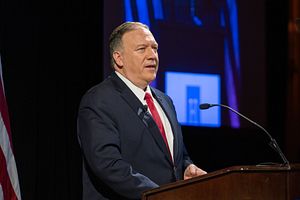In case reports of a potential “Phase 1” trade deal had anyone thinking U.S.-China frictions were nearing an end, a fiery speech from the U.S. secretary of state made it clear that confrontation is the new normal. Speaking at the Hudson Institute’s award gala in New York, Secretary Mike Pompeo lambasted China on multiple fronts, from the economic to the ideological. In Pompeo’s telling, the Trump administration’s harsher policies are a necessary – and long-term – course correction that addresses the “reality” of China today. Following the previous model of U.S. China policy “is no longer realistic,” he said.
“It’s critical that as Americans, we engage China as it is, not as we wish it were,” Pompeo declared.
The view that U.S. China policy is due for a more muscular upgrade is not unique to the White House. In a recent op-ed, the ranking Republican on the House Foreign Affairs Committee urged that “We must responsibly counter China now or risk being subjected to their malign influence across the globe.” Such sentiments are increasingly common in Washington, from think tanks to Congress to the White House and its Cabinet.
Before delving into the “China challenge” – the title of his address – Pompeo first outlined what he saw as the flaws in past U.S. policy: “Frankly, we’ve been slow to see the risk of China… we accommodated and encouraged China’s rise for decades, even when – even when that rise was at the expense of American values, Western democracy, and security, and good common sense.”
He pins the blame for that on various actors in the United States. First and foremost, there’s what Pompeo termed the “permanent class of China lobbyists in the United States,” whose “primary job is to sell access to Chinese leaders and connect business partners.” Pompeo also accuses academics of downplaying valid concerns. As a result, Pompeo argued, the U.S. was slow to realize “the degree to which the Chinese Communist Party is truly hostile to the United States and our values, and its worse deeds and words and how they impact us.”
That “hostile” impact was outlined in a comprehensive list of issues: “competing ideologies and values,” Chinese Communist Party (CCP) influence operations and interference, China’s “impact on the international order,” economic issues, and military competition. Notably, Pompeo promised that he will be giving a series of remarks going into each of these various topics more deeply. That means we should see more comprehensive U.S. objections (and perhaps possible solutions, which Wednesday’s address was short on) rolled out at regular intervals in the coming months. And each time, China will react angrily, as it did on Thursday.
In a regular Ministry of Foreign Affairs press conference on October 31, spokesperson Geng Shuang lambasted Pompeo’s address:
Pompeo’s speech maliciously attacked the Communist Party of China and the Chinese government, tried to drive a wedge between the CPC and the Chinese people and deliberately distorted and slandered China’s domestic and foreign policy. It fully exposes the deep-seated political prejudice and dark anti-communist mindset of a handful of American politicians. Such remarks are by no means an embodiment of confidence and power, but rather reveal fear and arrogance.
The harsh rhetoric in both Pompeo’s speech and the Chinese response reveals that the fundamental tensions in U.S.-China relations are deep-seated and stretch far beyond trade. And the exchange of barbs undercuts the somewhat incongruous optimism Pompeo himself expressed for the Phase 1 trade deal.
In closing, Pompeo included in his speech an overview of what the United States would like to see from China;
We don’t want a confrontation with the People’s Republic of China. In fact, we want just the opposite.
We want to see a prosperous China that is at peace with its own people and with its neighbors.
We want to see a thriving China where the Chinese business community transact business with the rest of the world on a fair set of reciprocal terms that we all know and understand.
And we want to see a liberalized China that allows the genius of its people to flourish.
And we want to see a China that respects basic human rights of its own people, as guaranteed by its own constitution.
Pompeo’s ideal vision for China was offered just before the Chinese Communist Party concluded the fourth plenary session of its 19th Central Committee – and in doing so reaffirmed the CCP’s blueprint for the country moving forward. That prescription is, essentially, more of what we’ve already seen under Xi Jinping, starting with a full-throated endorsement of “upholding the centralized and unified leadership of the CPC” and “maintaining political stability” (CCP code for quashing any dissent).
It’s abundantly clear that what the CCP wants for China’s future is incompatible with what the United States hopes to see. No trade deal – if one is ever actually concluded – will wave away that discrepancy.

































